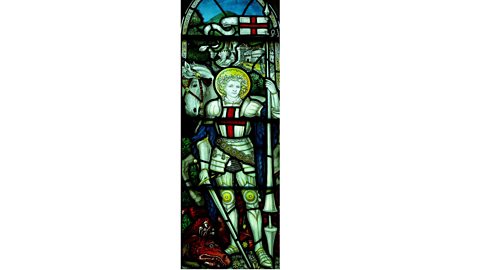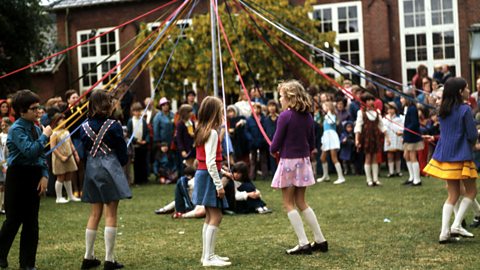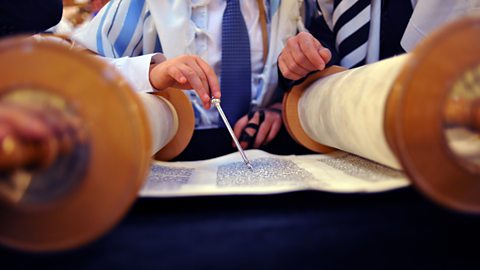Themes:
The patron saints of the UK and Ireland; Saint George - the patron saint of England; what we can learn from the lives of great people, devotion.
Before the programme
- Who is the man in the picture? What do we know about him?
- Retell the story of St George and the dragon. Do you think it is a true story? Why?
- What adjectives would you choose to describe St George?
Programme content:
Welcome and introduction Ben returns to the theme of the four patron saints of the UK and Ireland. He also offers some more clues to help listeners decide who todayâs saint is.
Vox Pops Children talk about times when they have been brave.
Story The story of Saint GeorgeAn adaptation by Sue Reid of legends concerning Saint George. The story is told by an early Christian, a former resident of the city of Nicomedia, but now on the run for his beliefs. He tells us how he was once a soldier in the Roman army, serving the emperor Diocletian. The emperor orders the persecution of the Christians, but one soldier - George - refuses. We hear how George helps the early Christians to escape the persecution and even becomes a Christian himself. But then he is summoned before the emperor and when he refuses to renounce his faith, George must pay the ultimate priceâŠ
Song âThank you for the love of Jesusâ (Come and Praise: Beginning, no 38). Encourage the children to join in with as much as they can.
Reflection On the life of St George and his courage and how he was true to himself and his beliefs. Ensure everyone is listening carefully.
After the programme:
Talk about the storyNB There are some sensitive issues that may be raised by the story in this programme. Time should be allowed to handle childrenâs concerns carefully and any circumstances you become aware of during discussions should be handled in line with your schoolâs safeguarding policies.
- How does it feel when you have to leave things behind, like the old soldier did when he left Nicomedia?
- What do you think that the boy does to help him now that he is an old man?
- Do you think that the Christians had done anything wrong? Would you have followed your orders to hurt them?
- Why do you think George was tearing down the Emperorâs orders?
- What other brave things did he do in this story?
- Do you think the Emperor was a good man? What about George?
Follow-up activities:
- Find photos of people celebrating St Georgeâs Day (April 23rd - again, the date of his death in AD303). How are these similar to / different from the photos of celebrating the other saintsâ days weâve explored so far?
- Make St Georgeâs flags out of red and white paper, then in each quarter, write or draw some things that youâve been brave about.
- Find out about the Romans - and how they treated their Emperors like gods. Does this help explain why Emperor Diocletian was so angry about George?
- Reinforce with children what they should do about any incidents of bullying that they might see.
Click to display the image full size

Programme content:
Welcome and introduction Ben returns to the theme of the four patron saints of the UK and Ireland. He also offers some more clues to help listeners decide who todayâs saint is.
Vox Pops Children talk about times when they have been brave.
Story The story of Saint GeorgeAn adaptation by Sue Reid of legends concerning Saint George. The story is told by an early Christian, a former resident of the city of Nicomedia, but now on the run for his beliefs. He tells us how he was once a soldier in the Roman army, serving the emperor Diocletian. The emperor orders the persecution of the Christians, but one soldier - George - refuses. We hear how George helps the early Christians to escape the persecution and even becomes a Christian himself. But then he is summoned before the emperor and when he refuses to renounce his faith, George must pay the ultimate priceâŠ
Song âThank you for the love of Jesusâ (Come and Praise: Beginning, no 38). Encourage the children to join in with as much as they can.
Reflection On the life of St George and his courage and how he was true to himself and his beliefs. Ensure everyone is listening carefully.
After the programme:
Talk about the storyNB There are some sensitive issues that may be raised by the story in this programme. Time should be allowed to handle childrenâs concerns carefully and any circumstances you become aware of during discussions should be handled in line with your schoolâs safeguarding policies.
- How does it feel when you have to leave things behind, like the old soldier did when he left Nicomedia?
- What do you think that the boy does to help him now that he is an old man?
- Do you think that the Christians had done anything wrong? Would you have followed your orders to hurt them?
- Why do you think George was tearing down the Emperorâs orders?
- What other brave things did he do in this story?
- Do you think the Emperor was a good man? What about George?
Follow-up activities:
- Find photos of people celebrating St Georgeâs Day (April 23rd - again, the date of his death in AD303). How are these similar to / different from the photos of celebrating the other saintsâ days weâve explored so far?
- Make St Georgeâs flags out of red and white paper, then in each quarter, write or draw some things that youâve been brave about.
- Find out about the Romans - and how they treated their Emperors like gods. Does this help explain why Emperor Diocletian was so angry about George?
- Reinforce with children what they should do about any incidents of bullying that they might see.
KS1. May Day. audio
Join Ben Faulks for a programme all about May Day. Celebrating the start of summer; learning from the past, and the people who can help us to do that.

KS1. Rogation Sunday. audio
Join Ben Faulks for a programme all about Rogation Day. Family relationships - parents.

KS1. Shavuot. audio
Join Ben Faulks for a programme all about the celebration of Shavuot and what it represents for Jewish people; rules and why we need them; treating others as individuals.
